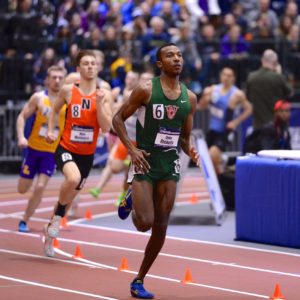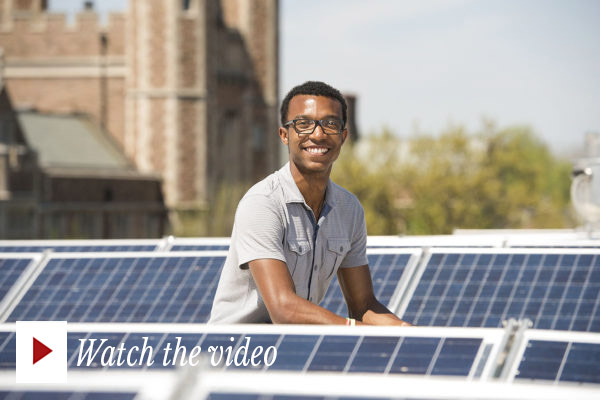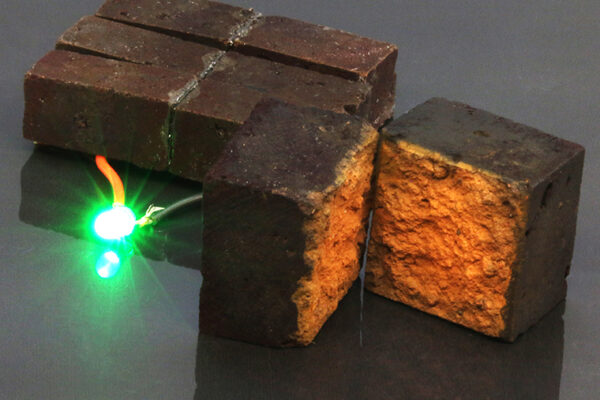During his sophomore year in high school, Deko Ricketts and his friends — he called them “The Bros” — got caught lighting matches in the chemistry lab. The stunt was stupid and dangerous. It also was not the first time The Bros broke the rules at Barstow, an elite, private school in Kansas City, Mo. The friends had a reputation for playing pranks and acting wild. They even commandeered an out-of-the-way nook and turned into their own hideaway, which they called Party Cove.
“You know the book, ‘The Outsiders?’” Ricketts said. “We felt like we were golden, like we could do anything we wanted.”
 Well, clearly not anything. After the chem lab incident, the head of school immediately suspended Ricketts and his friends and threatened expulsion. Ricketts panicked.
Well, clearly not anything. After the chem lab incident, the head of school immediately suspended Ricketts and his friends and threatened expulsion. Ricketts panicked.
“I decided I needed to be the best person Barstow has ever seen,” Ricketts said. “I told the head of school, ‘I’m going to get my grades up. I’m going to be a leader on the track team. I’m going to regain the trust that I’ve lost from my teachers. And I’m going to show you that this isn’t a definition of character but a lapse of character.’”
Ricketts did just that. So did his friends. They served as officers in student government and captains of sports teams. They starred in plays, started new clubs and, when it came time to apply to college, they all got accepted to their first-choice schools.
For Ricketts, that was Washington University in St. Louis.
‘Dream big, think big and expect big’
Four years later, Ricketts is ready to graduate from the School of Engineering & Applied Science with a degree in electrical engineering. At the Office of Sustainability, he sought out new renewable energy projects for the university. At the engineering school, he mentored classmates in circuit design. And, as a member of the track team, he set the school record this year for the men’s 800 meters with a time of 1:49.61 and won the NCAA Division III Indoor Track & Field national championship.

“Deko set school records and became an indoor national champion — all with a smile on his face guiding the men’s team,” head coach Jeff Stiles said. “People are drawn to him, and he has changed the team’s culture in terms of thinking big. He only knows one way — that’s to dream big, think big and expect big.”
Ricketts started two businesses at Washington University, neither of which succeeded — at least not in an obvious way. His first enterprise, See3, set out to design 3-D holograms. The idea was born in his high school physics class. His teacher was trying — and failing — to draw 3-D motions on a chalkboard. There must be a better way, thought Ricketts. After studying differential equations freshman year, Ricketts thought he found it. He got some friends together, won funding and started building models. But the more they learned, the more they realized what they did not know.
“We realized we needed to understand fluid dynamics,” Ricketts said. “And wind turbine design. Basically, there were a lot of things we needed to master before we could move on.
“We were literally taking things we had learned in class that day in putting them into our design. A month later, we would learn something new and change the design all over again.”
His second endeavor was called Solar Optics. Ricketts wanted to develop residential solar cells that could be mounted inside of a home. It was a good idea but he realized the supporting technology did not yet exist. He set aside the project, but not his passion for solar energy.
“WashU gave me the space to fail, not just mess up,” Ricketts said. “Messing up is getting suspended. Failing is doing what you think is actually right and not being good enough — at least not good enough yet.”
Going for ‘golden’
It has been an incredible journey for Ricketts, the youngest of four children. His mother, Nia Becker, remembers introducing a 7-year old Deko to fractions over a pie at Minsky’s Pizza. He got the concept right away, so they moved onto decimals. Soon, they were working out of a middle school textbook.
Becker could see her son needed to be challenged. So she wrote to Barstow and asked if they would admit three of her four children. Her eldest had already completed high school. It was an audacious ask for a woman who could not afford the tuition for one child, much less three. But Becker believed her children each had unique gifts to bring to Barstow. The school agreed and provided a large scholarship. Still, Becker needed to work two nursing jobs — one caring for the elderly in their homes; the other in a psychiatric ward. She was at work more than she was at home.
“It was hard for all of us,” Ricketts said. “I asked her why it was so important that I go there and she said, ‘I want you to know there is abundance in this world.’ Before Barstow, I never saw it. I entered a world where everyone was either rich, or a genius, or both.”
Though Becker struggled, her family boasted a proud legacy. Her grandfather earned a law degree from Columbia University, but was not allowed to take his board exams because he was black. Still, he worked with Marcus Garvey, a leader of the black nationalist movement. Her father, Leslie Becker, M.D., earned many “first black” accolades including first black physician appointed to teach at the University of Kansas School of Medicine and the first black doctor at Providence Hospital in Kansas City.
The grandfather was Ricketts’ earliest role model. But the man who lead him to Washington University was Sid Devins, M.D., the father of his longtime girlfriend Sky. Ricketts started dating Sky not long after his suspension and wanted to prove to both of them that he was worthy. Devins believed in Ricketts and encouraged him to apply to Washington University, where he had completed his medical school residency.
“He installed that confidence in me,” Ricketts said. “He took this idea of golden and made me feel like I could actually be whatever I wanted. It’s the difference between childishly believing you can conquer the world and realizing, ‘Yes, I have what it takes to make a difference.’”
But Ricketts knew confidence would not pay the bills. That’s why he ran track in the first place — to earn a scholarship. But when Washington University, a Division III school, offered him a large academic scholarship through the Enterprise Holdings Scholarship Program, Ricketts was as surprised as he was relieved.
“I could go to D-1 school to be a runner, or to a school like Missouri S&T to be an engineer,” Ricketts said. “But at Washington University, I knew I could do anything I wanted.”
‘All you need is to be smart enough’
What Ricketts wants to do is improve lives by addressing the global energy crisis. As the world’s population swells and usage surges, engineers must find ways to produce clean, cheap energy.
“Give a community electricity and you open so many doors,” Ricketts said.
Ricketts, himself, occasionally went without electricity as a child. He knows no electricity means no air conditioning in a blazing-hot summer, no light for homework.
“It’s not enough for a candidate to be a great engineer, but they need to be a great person. That’s Deko. He always wants to know, ‘How is this helping someone?’ ”
Marc Lopata
“I’m not going to pretend that my life was Third World,” Ricketts said. “When you can’t pay all the bills each month, you pick and choose and sometimes my family chose no electricity. But that experience helped me understand the importance of energy in a way most people can’t comprehend.”
Ricketts’ coursework and experience with his enterprise Solar Optics drew him to solar, the engineer’s energy. Think about it, he said. Nature has given us this clean, abundant resource. It’s up to engineers to turn it into fuel.
“With fossil fuels, the questions are, ‘Are you in the right spot? Do you have enough money to do these huge projects,” Ricketts said. “Solar is mind-driven: ‘Are you smart enough to make it happen? Is your engineering good enough?’
“When you start thinking about it that way, you realize you don’t need to be a huge company. There’s a reason why you don’t see any startup oil companies. But you can have a team of five engineers and do a multi-million dollar, 10-megawatt project because all you need to do is be smart enough.”
That’s exactly what Ricketts is doing. He is now an engineer for Azimuth Energy, a St. Louis-based firm that designs and builds large-scale solar projects for utilities, businesses and institutions like Washington University. Earlier, as an intern for Azimuth, Ricketts developed potentially life-saving technology that can remotely shut down rooftop solar arrays in the case of an emergency. All new construction boasts such rapid shut-down capabilities. But there are countless older buildings with no retrofit. That puts firefighters, who sometimes must cut through a roof to ventilate a building, at risk.
“Deko’s solution is simple, foolproof and attractive to the market,” said Marc Lopata, president of Azimuth Energy and SolarIsland Energy. “If you give people a solution that is cost-efficient, they are much more likely to do the right thing.”
After further testing, Ricketts and Azimuth hope to apply for a patent this summer.
Lopata said Ricketts’ idea is both results-driven and people-driven. He is excited Ricketts has accepted a position as full-time project engineer with his company, and has charged him with engineering solar and micro-grid projects.
“Before I hire anyone, I’ll typically interview 30 people,” Lopata said. “It’s not enough for a candidate to be a great engineer, but they need to be a great person. That’s Deko. He always wants to know, ‘How is this helping someone?’”



